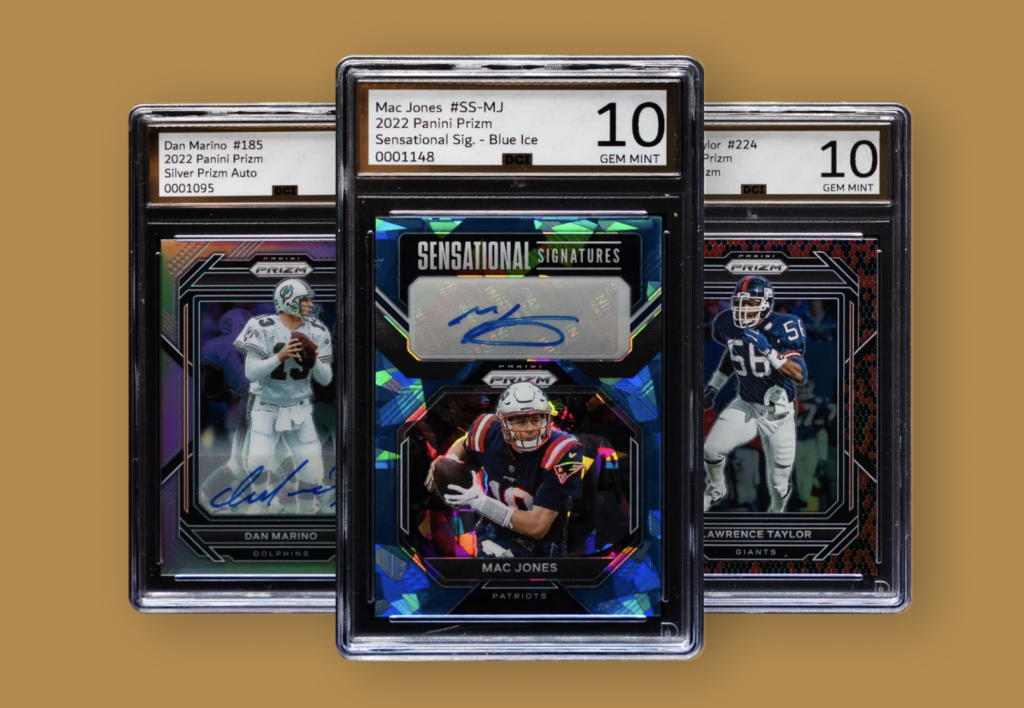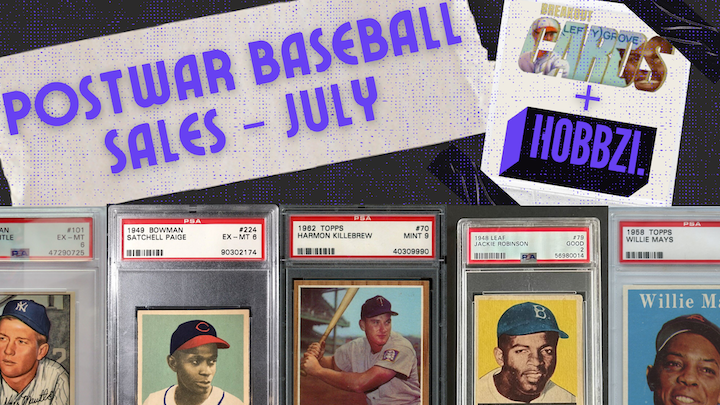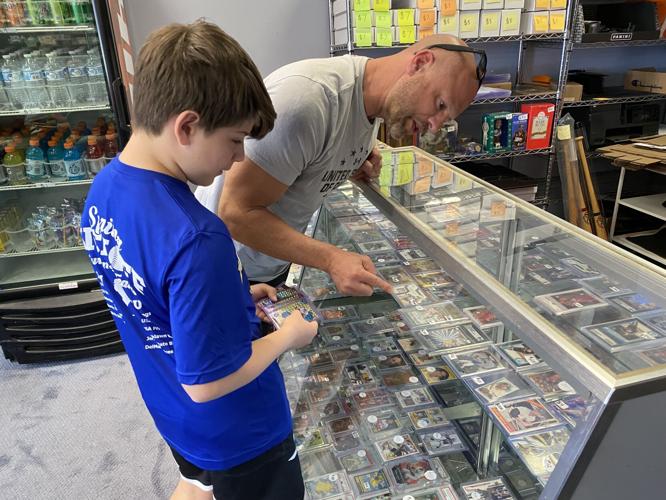One of the first questions someone new to The Hobby is going to have is, “What in the world of sports is a slab and where can I get myself one?!?” I’m glad you asked! Slabs and card grading are one of the fundamental foundations of the collectibles industry and, in addition to helping protect your cards, they help investors and collectors alike establish an objective measure of the condition of their cards.
Now that you understand the basic idea and purpose behind getting your cards “slabbed,” how do you make that happen?
How to Grade Your Cards
Having a sports card graded typically involves the following steps:
1. Select a Grading Company: There are several reputable grading companies that specialize in authenticating and grading sports cards, such as Professional Sports Authenticator (PSA) and Beckett Grading Services (BGS). Choose a grading company based on its reputation, the services offered, and your specific requirements.
2. Card Preparation: Before submitting your card for grading, it’s important to ensure that it is in the best possible condition. This involves careful handling to avoid damage and protecting it from dust, fingerprints, and other potential harm. Some popular choices for card protection include protective card sleeves or rigid cardholders that are used to safeguard the card during the grading process.
3. Submission: Once you decide on a grading company, complete the necessary paperwork and submission forms provided for your submission. This typically includes personal information, details about the card, and the grading service level you prefer (e.g., regular, express, or premium). You may also need to specify any additional services you want, such as autograph authentication or card encapsulation.
4. Grading Process: Once your submission is received by the grading company, the card goes through a meticulous grading process. Trained experts evaluate the card’s condition and assess factors like the centering on the card, the corners and edges, surface quality, and look closely for any potential flaws or alterations. Based on this examination, the card is assigned a grade on a predetermined scale, usually ranging from 1 to 10, with 10 being the highest.

5. Authentication: In addition to grading the card’s condition, the grading company also verifies its authenticity. This is particularly important for valuable or rare cards, as counterfeiting is a concern in the sports card market. The authentication process involves scrutinizing various aspects of the card, including holograms, signatures, stamps, and other identifying features.
6. Encapsulation (known as “slabbing”): After grading and authentication, the card is encapsulated by the grading company. This involves sealing it within a protective plastic case (also known as a slab) that displays relevant information, such as the card’s grade, authentication details, and any additional notes. The encapsulation helps preserve the card’s condition and provides a secure means of storage or display.
7. Return and Certification: Once the grading process is complete, the graded and encapsulated card is returned to the owner along with a certification label or tag. This label serves as proof of the card’s grade and authenticity, adding value and credibility to the card within the collecting community.
It’s worth noting that the specific procedures, turnaround times, pricing, and services offered by grading companies can vary quite a bit. Therefore, it’s essential to review the guidelines and instructions provided by your chosen grading company to ensure a smooth and accurate grading process for your sports card.

When to Grade Your Cards
Deciding when to grade a sports card is a personal choice and depends on a few factors. Here are a few situations where grading a sports card can be beneficial:
1. Rarity and Value: If you own a sports card that is rare, valuable, or highly sought after, grading can provide authentication and enhance its market appeal. Grading adds credibility to the card’s condition and authenticity, which can significantly increase its value and desirability among collectors.
2. Protection and Preservation: Grading companies encapsulate cards in protective cases, safeguarding them from potential damage caused by handling, environmental factors, and aging. If you have a valuable or sentimental card that you want to protect and preserve, grading can provide a secure and long-lasting solution to keep that grail card looking “gem mint” for years.
3. Selling or Trading: If you plan to sell or trade a sports card, grading can help attract potential buyers or traders. Graded cards often command higher prices (sometimes SIGNIFICANTLY higher) and are more likely to be trusted by collectors. The encapsulation and certification provided by grading companies can instill confidence in prospective buyers, leading to smoother transactions…plus, they look pretty cool!
4. Set Registry Programs: Some grading companies offer set registry programs where collectors can build sets of graded cards within specific categories or themes. Participating in these programs can be a motivating factor to grade cards and strive for completion, fostering a sense of accomplishment and competition within the collecting community.
5. Authenticity Verification: If you have concerns about the authenticity of a sports card, grading can provide professional authentication services. Grading companies thoroughly examine cards for signs of counterfeiting, alterations, or tampering, giving you peace of mind regarding the card’s legitimacy.
6. Personal Satisfaction: For some collectors, grading sports cards is simply a matter of personal satisfaction and enjoyment. It allows them to organize their collections, appreciate the condition of their cards, and engage with the hobby on a deeper level.
It’s important to note that not all sports cards need to be graded. Lower-value or common cards may not necessarily benefit from grading, as the cost of grading may outweigh the potential increase in value. (Although there are companies providing card reviews and lower-priced slabbing…) Ultimately, the decision to grade a sports card should be based on your specific circumstances, the card’s rarity and value, and your goals as a collector or seller.
Leading Grading Companies
There are several grading companies for sports cards, each with its own reputation and services. Here are some of the prominent grading companies and brief information about each:
1. Professional Sports Authenticator (PSA): PSA is one of the most well-known and is the most widely used grading company for sports cards. They have been in operation since 1991 and are highly regarded for their expertise in authenticating and grading cards. PSA uses a 10-point grading scale and offers services for both vintage and modern cards. They also provide additional services like autograph authentication and card restoration assessment.
2. Beckett Grading Services (BGS): Beckett is another prominent grading company in the sports card industry. They have been grading cards since 1999 and offer grading services for various collectibles, including sports cards, trading cards, and other memorabilia. BGS uses a dual grading scale that combines separate assessments for the card’s condition and centering. They also offer subgrades for different card attributes like corners, edges, and surface.

3. Certified Sports Guaranty (CSG): CSG is a relatively newer grading company that entered the market in 2020 and they’ve gained popularity for their competitive pricing and fast turnaround times. CSG offers grading services for sports cards, as well as coins and paper currency. They use a 10-point grading scale and offer additional services like autograph authentication and custom labels.
4. Sportscard Guaranty (SGC): SGC has been grading sports cards since 1998 and is known for its strict grading standards. They use a 10-point grading scale and are particularly popular among collectors of vintage cards. SGC also offers autograph authentication services and encapsulates cards in their proprietary tamper-evident holders.
5. Certified Collectibles Group (CCG): CCG is an umbrella organization that encompasses several grading companies, including PSA, CGC (Comic Book Certification Service), and others. Each company under CCG focuses on a specific collectible category, and PSA handles sports card grading within the group. The advantage of CCG is that you can submit different types of collectibles to multiple grading companies through a single submission process.
These are just a few examples of some of the larger grading companies in the sports card industry. Keep in mind that there are other options with impeccable reputations that can review your cards and even slab them for reasonable prices and very quick turnaround times. If you choose to get your collection graded, it’s important to conduct your own research. Be sure to consider factors such as reputation, turnaround time, grading standards, pricing, and customer reviews when selecting a grading company for your sports cards.
In the meantime, for more featured articles, news and trending videos from all around The Hobby, check out more from HobbziMedia.com!













